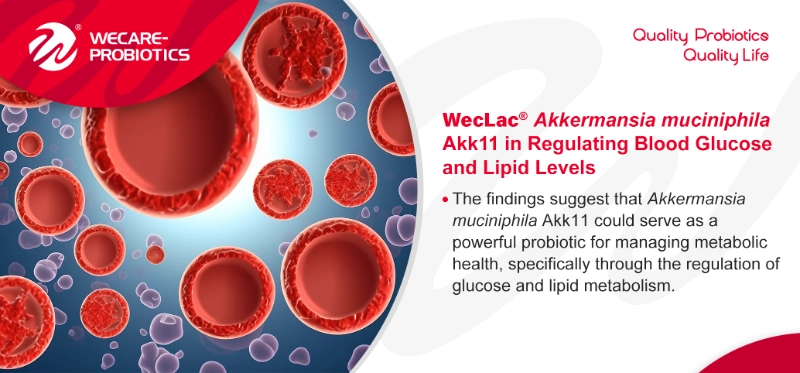
Abstract:
This study introduces a novel strain of Akkermansia muciniphila Akk11, isolated from healthy infants and demonstrating significant efficacy in regulating blood glucose and lipid levels. This strain offers promising therapeutic applications in the prevention and treatment of metabolic disorders such as obesity, hyperlipidemia, and hyperglycemia.
Keywords:
Akkermansia muciniphila Akk11, blood glucose regulation, lipid metabolism, obesity, hyperlipidemia, hyperglycemia, probiotics.
Introduction:
With increasing rates of metabolic disorders such as obesity, type 2 diabetes, and related dyslipidemia, the gut microbiota has been recognized for its role in metabolic regulation. Akkermansia muciniphila, a gut-residing bacterium, is negatively correlated with obesity and glucose intolerance, acting as a key regulator of glucose and lipid metabolism. This paper discusses the isolation and application of Akkermansia muciniphila Akk11 for improving metabolic health.
Materials and Methods:
Isolation of Akk11: The Akkermansia muciniphila Akk11 was isolated from fecal samples of healthy infants using a mucin-based medium. The strain was preserved under the deposit number CCTCC NO: M 2024119, dated January 15, 2024.
Bacterial Culture: Akk11 was cultured in mucin-based media at 35-38°C for 18-22 hours, optimizing its growth and functionality for experimental purposes.
Probiotic Formulation: The probiotic product contained at least 1×1010 CFU/mL of Akkermansia muciniphila Akk11, with optional combinations of Bifidobacterium longum subsp. longum BL21 to enhance its metabolic effects.
Results:
Glucose Metabolism Improvement: In high-fat diet mouse models, Akk11 demonstrated a significant reduction in blood glucose levels by improving glucose tolerance. This was measured using Oral Glucose Tolerance Tests (OGTT), showing enhanced glucose utilization over time.
Lipid Profile Regulation: Mice treated with Akk11 showed decreased levels of total cholesterol, triglycerides, and low-density lipoprotein (LDL), while increasing high-density lipoprotein (HDL) compared to control groups. This indicates a strong lipid-regulating effect.
Anti-inflammatory Effects: Akk11 reduced inflammatory markers, such as IL-2 and IL-6, while increasing IL-10 levels, showcasing its anti-inflammatory potential, particularly in gut-related inflammation due to metabolic syndrome.
Discussion:
The findings suggest that Akkermansia muciniphila Akk11 could serve as a powerful probiotic for managing metabolic health, specifically through the regulation of glucose and lipid metabolism. Its combination with Bifidobacterium longum subsp. longum BL21 further enhanced its effects, making it a suitable candidate for the development of therapeutic products targeting obesity, hyperlipidemia, and hyperglycemia.
Conclusion:
The strain Akkermansia muciniphila Akk11 represents a promising microbial agent for metabolic health interventions. Its potential applications in functional foods and supplements offer a novel approach to prevent and treat metabolic disorders, providing a safe, effective alternative to conventional therapies.








